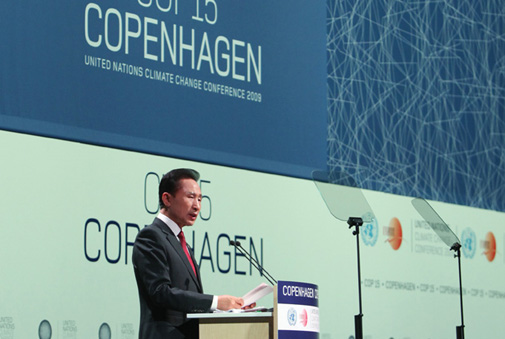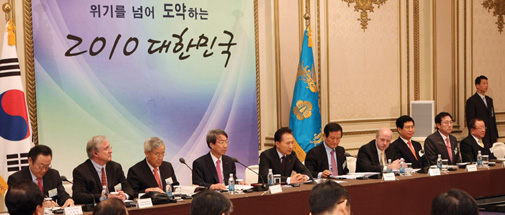President Lee Visits Copenhagen for Climate Change Summit
Korea is eager to host the next conference
 President Lee Myung-bak has turned his eyes to the global climate change issue as part of efforts to give a boost to his much-touted policy toward green growth.
President Lee Myung-bak has turned his eyes to the global climate change issue as part of efforts to give a boost to his much-touted policy toward green growth.
He has also remained committed to pressing ahead with the controversial issues of the development of the nation¡¯s four major rivers, despite growing resistance from the opposition parties and civic organizations.
The president visited Copenhagen, Denmark, to attend the 15th United Nations Climate Change Conference (COP15) on Dec. 17-18.
The role of the Republic of Korea as a leader in international efforts to cope with climate change has attracted the global spotlight thus far. In this context, the Korean government expects that President Lee¡¯s participation as a head of state that will host the G-20 Summit in late 2010 will make a significant contribution to the Copenhagen Conference.
Considering several pending issues to be addressed within the country, President Lee will make his trip as short as possible. He will leave on the morning of Dec. 17 with a minimal delegation.
Among the leaders attending the conference are presidents and prime ministers from about 100 countries, including the United States, China, Japan, the United Kingdom, France and Brazil, as well as heads of international organizations such as the United Nations.
At the summit, President Lee is planning to emphasize the nation¡¯s plan to assume a leading role in dealing with climate change through various policy measures such as low-carbon, green growth. He will also urge participating leaders to carry out similar moves, which would be conducive to promoting national interests and prestige.
On Nov. 17, Korea set its greenhouse gas emissions reduction target for the first time as a non-Annex I country. In a voluntary and unilateral move, South Korea will be committed to cutting carbon emissions by 30 percent from its business-as-usual (BAU) level forecast for 2020. As such, Korea has set a good example as one of the leading nations in response to global environmental issues, thereby garnering positive responses from the international community and the foreign media.
Immediately after his arrival in Copenhagen, President Lee is scheduled to make a keynote speech at the summit where he will elaborate on the Korean government¡¯s diligent responses to climate change. The speech will most likely center on the need to voluntarily establish and carry out aggressive mid-term goals for carbon emissions reductions and the direction of implementation of green growth policies. Furthermore, he plans to propose a Nationally Appropriate Mitigation Action (NAMA) Registry, which the Korean Government has been trying to persuade countries to adopt through several international negotiation channels.
As the chair of the G-20 summit scheduled for late next year, President Lee will emphasize the importance for the forum of advanced economies to take up climate change as a priority issue and work closely among its members. On the sidelines of the Copenhagen summit, the Korean president plans to hold various bilateral and multilateral meetings with European leaders, which is expected to help expedite the ratification process of the Korea-EU Free Trade Agreement.
While pushing for the Copenhagen agenda on one side, President Lee is also determined to go ahead with his plan to develop the four major rivers across the nation.
Only creative investment, with an eye on the future, can attain sustainable growth, emphasized President Lee in his keynote speech at the 46th Trade Day ceremony held at COEX Center in Samseong-dong, Seoul on Nov. 30.
¡°In this era of the forming of a new world order, we need to work hard with a mindset of starting everything anew,¡± said President Lee. ¡°International bodies have recently changed their stances, saying Korea would record a positive growth next year from minus 4.5 percent growth as was predicted earlier,¡± the president said. ¡°The world regards Korea¡¯s risk management highly.¡±
The president said, however, it still doesn¡¯t mean Korea has overcome the crisis completely. He pointed out that while the world at large is showing signs of recovery, countries like the United States and Japan, which also happen to be some of Korea¡¯s biggest export markets, have yet to make a full comeback.
¡°In order to keep up the competitiveness of existing major industries like shipyards, cars, semiconductors and cell phones, we need to combine them with information technology, nanotechnology and biotechnology. And to secure core source technology we need to maintain steady expansion in R&D investment.¡± President Lee then explained that he¡¯d increased next year¡¯s R&D budget by about 14 percent and would pull up Korea¡¯s GDP by 5 percent by 2012 to back up businesses.
The speech also touched on the importance of environment-friendly technology. ¡°Reducing greenhouse gases would be a burden for individual companies for the time being, but needs to be done as it could heighten the competitiveness of exports in the long run,¡± he said, adding that the government would also work together to relieve industry¡¯s burden and set up customized measures for gas emission quotas.
¡°Along with emission reductions, we need to make bold investments in green technology,¡± the president said. ¡°We need to heighten energy efficiency through new sources of energy, such as renewable ones, and pour the best of our efforts into developing a smart grid, carbon capture & storage technology and other low-carbon technology.¡±
The president went on to mention the rise in demand for various plant facilities such as nuclear power plants, oil refineries and fresh water facilities. He said such is the example of a true conversion industry, as it brings together design and construction, which is a combination of software and hardware. ¡°This is also the field where Korea has already proved its worth and is highly likely to be nurtured as a future field of exports,¡± he said.
¡°In the not too distant future, we¡¯ll reach an era of US$500 billion exports and a trade volume worth $1 trillion,¡± President Lee said. ¡°By next year, Korea, as the host nation of the G20 Financial summit, will further upgrade the country¡¯s image, changing the so-called ¡°Korea discount¡± to a ¡°Korea Premium.¡±
President Lee has been buoyed by recent polls which show his popularity has continued to increase momentum to the 50 percent level, proving growing public expectations for his pragmatic, economy-first policies despite the lingering economic recession. nw
South Korean President Lee Myung-bak gives a key-note speech at the 15th Climate Change Conference in Copenhagen on Dec. 19.
President Lee Myung-bak presides over a government-civilian session on the status of the national economy and the government¡¯s economic tasks in which representatives from government, industry, academia and other walks of life discussed economic policies the government will implement in 2010 at Cheong Wa Dae on Dec. 10.
Photo by courtesy of the MCST
3Fl, 292-47, Shindang 6-dong, Chung-gu, Seoul, Korea 100-456
Tel : 82-2-2235-6114 / Fax : 82-2-2235-0799